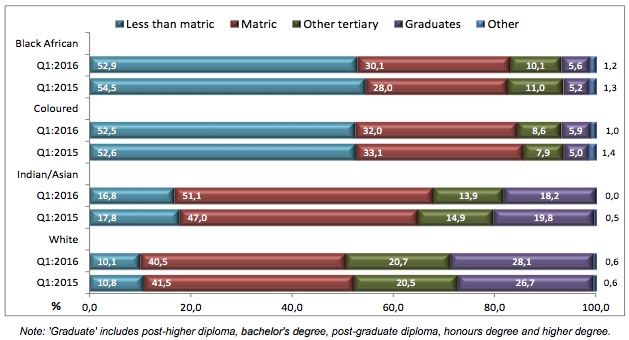Do you have a degree? The increasing job requirement...

There are various industries that require vacant posts to be filled and Adzuna lists over 130,000 online job listings. Yet finding skilled personnel can be difficult. Needless to say, it isn’t always up to a single qualification to get a job seeker through the recruitment process. Some candidates show great potential when it comes to knowledge and skill, as well as attitude, over degrees or having actually been granted the opportunity to study further.
According to statistics recorded by the Council of Higher Education, the year 2010 saw an influx of students enrolled into tertiary institutes. Both the private and public learning institutes produced more qualified individuals over various industries. Yet the percentage of graduates in the job market is low, with Stats SA citing numbers across races, the highest being the one of smallest population groups at 28.1% (see figure).

Benefits of having a degree in South Africa
Some advantages to studying in South Africa include being able to study via correspondence, full-time or part-time, giving the student more flexibility. This also leaves room for juggling a job to generate income alongside studies.
Other advantages include:
- Becoming a better educated individual
- Depending on your institution and career choice, you may be able to work abroad being internationally qualified
- Tertiary education is a positive impact on the country’s economy
- Be considered for higher paying jobs in various industries
- Get better promotion possibilities
- Overall respect from other professionals
One huge benefit is of course the salary one can earn if one lands a job – Adzuna reports the average salary for job listings requiring a degree to be just north of R40,000 per month (R487,050 per annum).
Are all qualified jobs secure?
Ironically, despite the fact that South Africa increased job employment to individuals bearing degrees, there are still plenty of qualified individuals that are unemployed. With all the economic events and political issues that the country faces, it is said to become even more difficult in 2017. Some companies may not be able to afford their staff and these employees may simultaneously be demanding salary increases in order to keep up with the ever-rising economic costs, resulting in job losses and even more unemployment.
Some individuals look for work despite being overqualified and having to considerably drop their actual salary potential. Others join professional organisations to network with other professionals in their same career.
A tertiary education will always triumph and benefit in the long run and thus always a great option for securing a good future in the workplace. But as recent research shows, having a degree, while rare, can definitely boost one’s earning potential.

























